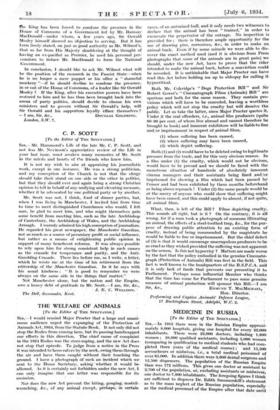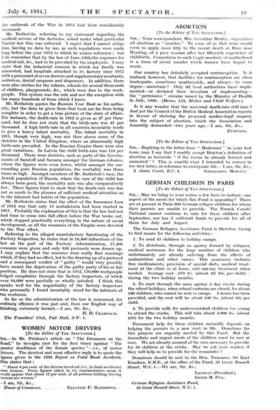MEDICINE IN RUSSIA [To the Editor of THE SPECTATOR.] -
SIR,—In 1913 there were in • the Russian Empire approxi- mately 8,000 hospitals, giving one hospital for every -22;009 inhabitants. There were 22,000 doctors; inekiding ' 1;800 women ; 28,000 nualified assistants, including 5,000 Women (comparing in qualification to medical students who had com- pleted three -years of the medical course) `aird 15,500 accoucheurs or midwives, i.e., a total medical peisonnel of over 65,000. In additiOn there were 3,600 dental surgeons and 12,500 dispensers. The popUlation of the Russian Empire then was 172 millions. This gives one .doctor or assistant to 2,700:'of the population,excluding assiStaitti midwives, one doctor to 7,800 inhabitants. The foregoing figures I think are sufficient to disprove Dr. Edith. Summerskill's statement as to the mass neglect of the Russian population, especially as the medical-personnel of the Empire after that date until
the outbreak of the War in 1914 had been considerably increased.
Mr. Rothstein, referring to my statement regarding the medical service of the factories, asked under what particular Tzarist law this was enforced. I regret that I cannot oblige him, having no data by me, as such regulations were made long before the year 1912 to which he makes reference ; but I do remember that by the law of June,1903, the expenses for medical aid, &c., had to be provided by the employers. I may state that the industrial concern in which my family was interested, had hospitals attached to its factory since 1875 with a personnel of seven doctors and supplementaryassistants, midwives, dental surgeons and dispensers. In addition, there were also crèches for the infants, schools for several thousands of children, playgrounds, &c., which were free to the work- people. This system_ was the rule and not the exception with the many hundreds of firms which I knew.
Mr. Rothstein quotes the Russian Year Book as his autho- rity, but the data he gives from that book are far from being complete in order to get a true picture of the state of affairs. For instance, the death-rate in 1912 is given as 27 per thou- sand, but he does not state that the birth-rate was 45 per thousand. A high birth-rate in all countries invariably tends to give a heavy infant mortality. The infant mortality in 1911, though very high, was not then above some of the districts in the United Kingdom, where an abnormally high birth-rate prevailed. In the Russian Empire there were also great variations. In Latvia the child birth-rate was 110 per thousand. There were districts, such as parts of the Govern- ments of Saratoff and Samara amongst the German colonies, where the figures were even lower, whilst amongst the sur- rounding pure Russian population, the mortality was three times as high. Amongst members of Mr. Rothstein's race, the Jewish population of Russia, where the care of the child has always been good, the mortality rate was also comparatively low. These figures tend to show that the death-rate was due not so much to the absence of sufficient medical attention as to the inherent bad habits of the population.
Mr. Rothstein states that the effect of the Insurance Law of 1912 was that only 15 ambulatoria had been started in 1917. Probably the explanation of this is that the law had not had time to come into full effect before the War broke out, which stopped practically everything in the nature of social development, as all the resources of the Empire were devoted to the War effort. .
Referring to the alleged unsatisfactory functioning of the Factory Inspection, he states that in 18,400 infractions of the law on the part of the Factory Administration, 17,400 censures were given and only 850 protocols were drawn up.
I may explain that the censures were really first warnings which, if they.had no effect, led to the drawing up of a protocol and a consequent verdict of " guilty " would very possibly have meant the deprivation of the guilty party of his or her position. He does not state that in 1912, 150,000 workpeople lodged complaints through the factory inspectors, of which over 94,000 were partially or wholly satisfied. I think this speaks well for the impartiality of the factory inspectors who personally I found invariably stood for the interests of the workmen.
So far as the administration of the law is concerned, for ordinary offences it was just and, from our English way of thinking, extremely lenient.—I am, Sir, &c.,











































 Previous page
Previous page